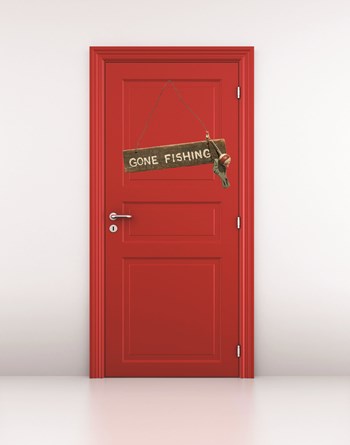
If it's like a ghost town in your building and summer hasn’t hit yet—where is everybody?
Maybe they’re on a winter hiatus and are inhabiting their second home in Florida—and that possibly means a season-long absence from their co-op or condo. Lucky for them, but how does it affect the rest of the building community when a large portion of the resident snowbirds have gone AWOL? What special precautions should the board and manager take to keep the building running safely and smoothly through periods of mass vacancy?
Lonely Leaks
According to Michael Berenson, president of Manhattan-based management firm AKAM Associates, “When an owner is away from their co-op or condo apartment for any period of time, the major concern is making sure that nothing happens in the apartment to jeopardize the life or safety of others in the building. Most significant are temperature-related concerns, because pipes can freeze and burst in apartments where the temperature is not regulated.”
Managing agent Arnie Lauri, who is with Midboro Management in Manhattan, shares Berenson's concern: “If somebody isn’t in an apartment for a month or two months and there is a leak,” says Lauri, “you may not see the damage for a while.” Once the water penetrates the apartment’s flooring, he explains, “it finds its way. It can skip floors, and stay in certain areas.”
Lauri, who previously worked for Argo Real Estate, recalls a leak in a condominium apartment a couple of years ago. The owner was away for a month and the water supply line for their toilet cracked. While the apartment of origin was on the 14th floor, the building staff weren’t aware of the leak until it hit the lobby. “It bypassed 12, and did damage on some floors and not others,” says Lauri. “The most damage was to the first residential floor—the last area where there was a concrete slab.”
The apartment with the leak was heavily damaged, as were some others down the line. “We called in our restoration company,” recalls Lauri, “and they came and cleaned it up and set up dehumidifiers and blowers in the areas that needed drying out.”
The second call he placed was to the building’s insurance company, and then, he says, “We sent out emails to anyone who was affected, telling them to please contact their insurance company.”
As it happened, the woman who owned the apartment had no homeowner’s insurance, so she had to pay for the damage to her place out of pocket. But lucky for her, each of the affected apartments below did have insurance, and none sued. The outcome for all concerned could have been far worse than it was, considering the fact that leak began to make its way through the building during a work day, when all the residents below were at work and no one was around to take notice. Fortunately, the building staff spotted the leak as soon as it hit the lobby.
The Key is the Key
The saving grace, says Lauri, was that the building staff had a key to the leaky apartment. “Once it hit the lobby, the super was able to get the key, shut the water off and get a plumber in there to fix it.”
Water damage is not the only problem vacant apartments can cause. Chief among other potential disasters are electrical fires caused by appliances—particularly stoves—left running, or faulty wiring in the walls. Garbage left to rot is another especially delicate issue, attracting predatory animals of all sorts and causing a stink, quite literally. Music left on loudly as a security measure can drive the neighbors crazy.
All of these problems can be mitigated with one simple precaution: “Have residents put a set of their apartment keys into an emergency key system,” advises Doug Weinstein, AKAM's director of operations and compliance. “These keys are to be used only for access in such cases as a flood or gas leak, etc. Co-op and condo bylaws typically allow for emergency access to apartments when no key is provided.”
It’s a simple solution, but not always an easy one. “Some people don’t like providing their keys,” says Lauri. “People are fearful of strangers going into their apartment, whether because of cleanliness, or they fear people will take something from them.” To win their cooperation, he says, “you stress that they are liable for any damage if we cannot get into their apartment. And if we have to use the locksmith or damage the door to get in, they are responsible for any repairs.”
Get Contact Info
In addition to keys, all owners and residents—especially those who take off for extended periods of time—should leave their contact information with the building, including their cell phone number and email address. Also, says Berenson, “The manager should get the name and contact information of a third party who could be reached in lieu of the resident in case of emergency.”
The super or manager should always contact the owner before entering, cautions Lauri—“in case somebody says, ‘You went in unauthorized and I left something on the counter and now it’s not there.’ If you give notice saying that you need to get a plumber in right away because you think there is a leak coming from the apartment, at least you have that coverage.”
The manager or board should send out emails urging all residents to leave their contact info at the front desk and keep it up to date. They should make it a requirement in new buyer and sublet packages.
In addition to obtaining keys and contact information, there are a number of proactive measures the building can take in advance of long-term vacancies. For one, the board or management can send out and post periodic communications, especially in advance of the winter and summer vacation seasons, detailing protocols for securing apartment units that will be vacant for extended periods.
Before You Leave
These preseason reminders usually contain such suggestions as double-checking that all electrical appliances are turned off and/or unplugged; throwing out all trash; closing windows to prevent pipes from freezing in winter; and setting air conditioners at a minimal cooling temperature in summer to prevent humidity from delaminating textured ceilings or warping wooden floors.
Vacationers should also be reminded to keep their monthly maintenance payments up-to-date, by submitting post-dated checks before they leave or setting up auto-pay with their bank or the manager’s website, if it provides that service. That way, not only will their fees be paid on time, they won't have to even think about it while they're away enjoying their time off.
People should be encouraged to enlist a neighbor or staff member to check on their apartment on a weekly basis and run the drains and flush the toilets. “The water in the trap is a barrier block for odors,” explains Lauri. “If nobody is in there flushing your toilets or using the sinks for a long period of time, the water in the trap will evaporate, and once it evaporates, the people above and below might get a bad smell.” Management should also explain to residents in units above the long-term vacant apartment that their water pressure could dip temporarily without one or more apartments in that line helping to pull water up, especially on the higher floors.
Regular communication via email is also useful in keeping vacationers abreast of building issues. “Notices and newsletters,” says Weinstein, “are the best way to keep all interested parties apprised of what’s going on in the building. As long as management has an email address and owners are able to access building information electronically from remote locations, there is no reason why they can’t be in the information loop at all times, no matter where they are or how long they’re away.”
Get Covered
The board should require that every owner in the building carry homeowner’s insurance. Normal homeowner’s insurance covers the co-op or condo unit even during long vacancies.
The coverage is more complicated if the co-op or condo is the owner’s secondary residence. According to insurance broker and consultant Edward J. Mackoul, president of Mackoul & Associates Inc. in Island Park, “If it’s your secondary home, some companies will not offer to cover. Some will, but at a higher rate, and they will want to know what controls are in place—if someone has key access and how often they are checking on the place.”
There is a special precaution an owner should take if they are subletting the apartment in their absence, says Mackoul. “The homeowner should require the person subletting have their own insurance to protect them in case they do something that causes damage,” in which case, the unit owner could be held responsible. “If the tenant leaves the water running in the sink or the bathroom and it overflows and causes damage to someone else’s property below, they can be dragged into a lawsuit. If the subtenant has renter’s insurance it could deflect the cost to the owner,” he explains.
Eyes Wide Open
The rules of the co-op or condo determine the short-term sublet policy. Some do not allow sublets of less than a year or six months. Whatever the policy, the staff, especially the doorman, should be recruited to help enforce it by paying close attention to guests, short and long-term. They should make sure the owner’s “niece”—“it’s always a niece or nephew,” notes Lauri—doesn’t overstay the unit owner’s limit.
“We scan their ID and enter them into the BuildingLink system,” says Lauri. “Once you have a copy of the photograph and the name and you can match it up with who is supposed to be there.”
What if staff members choose to take their vacations at the same time of year, as they often do in spring or early summer?
“Effective management requires that staff members advise management as far in advance as possible of anticipated vacations,” according to Berenson, “and that there is always be a pool of qualified relief workers available who can serve until the regular staff members return to their posts.”
With sufficient precautions in place to ward off and respond to emergencies, vacation season can be as enjoyable for those who stay home year-round as for those snowbirds who flee. There’s a more laid-back atmosphere in and around the community but diligence needs to be taken to ensure the building’s property and resident’s personal possessions remain safe and secure.
Steven Cutler is a freelance writer and a frequent contributor to The Cooperator.






Leave a Comment